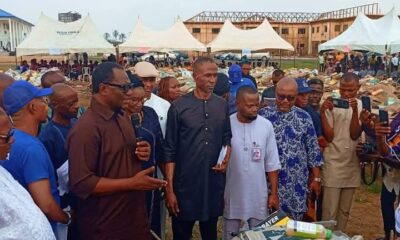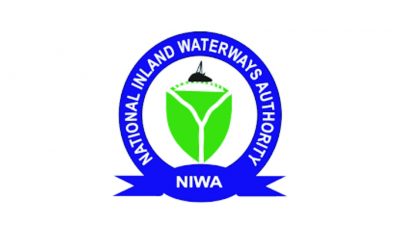Featured
FG Set To Announce New Salary Increase
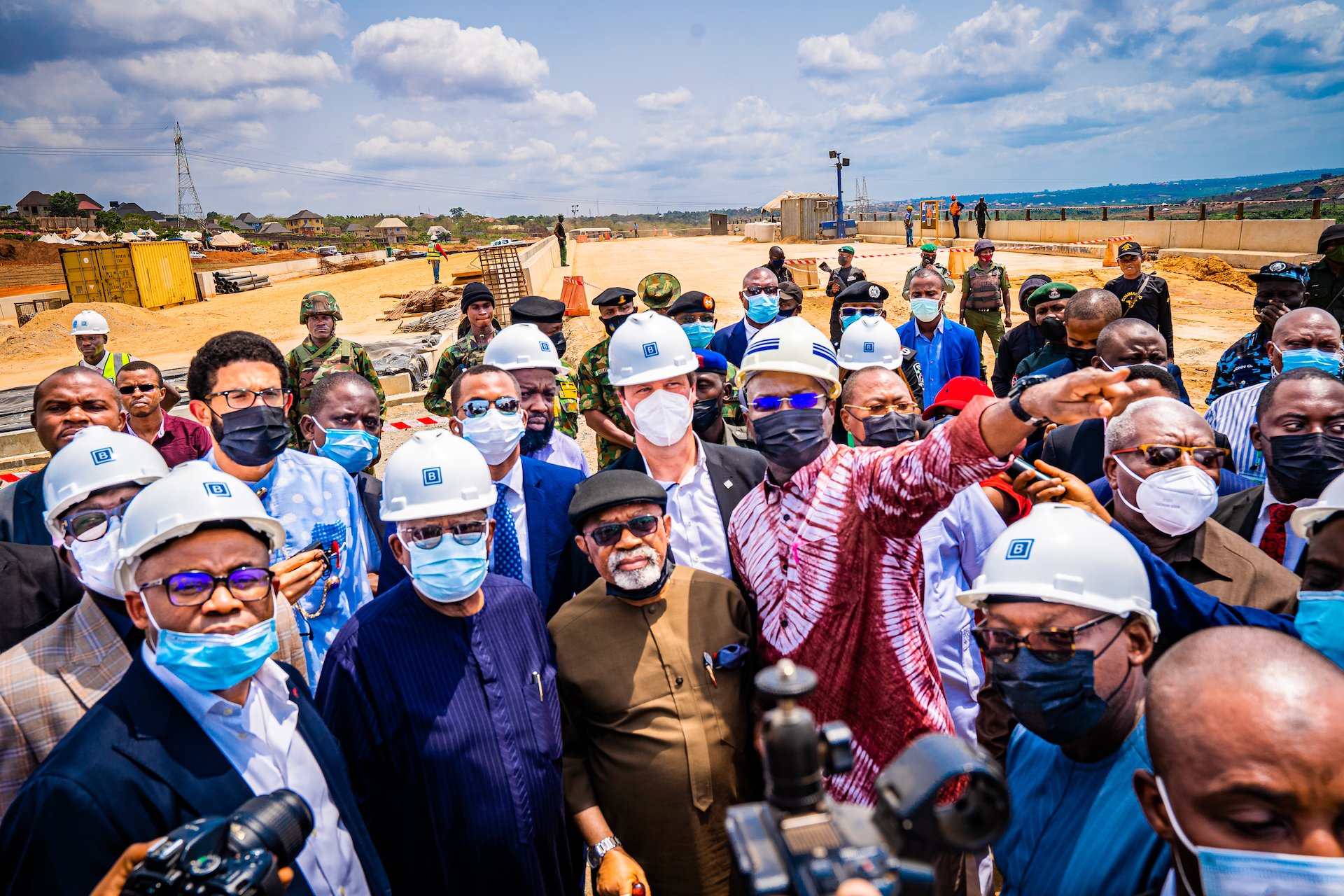
The Federal Government said it would soon make a pronouncement on salary increases for civil and public servants to cushion the effect of the high inflation rate.
The government said already the Presidential Committee on Salaries was doing a review, and was expected to come up with salary adjustments in 2023.
Minister of Labour and Employment, Senator Chris Ngige, disclosed this to State House correspondents after he had a closed-door meeting with President Muhammadu Buhari at the Presidential Villa, Abuja.
Ngige, who said that he was at the seat of power to discuss exhaustively issues concerning his ministry, including employment and productivity, described 2022 as a year of industrial dispute.
Recall that the minister had recently hinted that the government would adjust workers’ salaries to meet up with the economic realities in the country occasioned by inflation.
Asked whether he discussed the issue of salary increase with the President looking at the rising inflation, he said:”Yes, that’s what I am saying that the Presidential Committee on Salaries is working hand-in-hand with the National Salaries Incomes and Wages Commission. The commission is mandated by the Act establishing them to fix salaries, wages, and emoluments in not only the public service.
“If you want their assistance and you are in the private sector, they will also assist you. They have what is called the template for remuneration, for compensation. So, if you work, you get compensated, if you don’t work, you will not be compensated.
“So, they have the matrix to do the evaluation, so they are working with the Presidential Committee on Salaries chaired by the Finance Ministry, and I’m the co-chair to look at the demands of the workers. Outside this, I said discussions on that evaluation are going.”
Also asked whether a timeline has been fixed for the implementation of the new salary increase, he said:”As we enter the New Year, government will make some pronouncements in that direction.”
On why he was at the State House, Ngige said he came to brief the President on the activities of his ministry as the year comes to an end.
According to him, “Well, majorly, I came to brief Mr. President, you know the year is coming to an end and we have to look at our 2022 exhaustively. Part of my ministry, we are to discuss labour issues…and what we are able to do. First and foremost, we look at the employment situation in the country and what we have achieved and what we have not achieved.
“Employment is high and various policies and I have to tell him the successful ones we are in them. We also had a briefing on productivity viz-a-viz the various industrial disputes we had in 2022.
“It’s a year we can call a year of industrial dispute starting from the February Academic Staff Union of the Universities (ASUU) strike which was joined by other sister unions in the university system and even the people in the research institutes.
“And thereafter, threats from various unions including the medical doctors association and its youth wing, the National Association of Resident Doctors, JOHESU which is also the Joint Health Sector Union all were asking for a wage increase.
“Asking for a wage increase can also be understandable because of what inflation had done in the economy and the attendant cost of living for people who have to be workers in the public sector. In the private sector, the private sector employers have managed their affairs better, maybe, because their finances and their management is within their very audit and they could control it, they could do collective bargaining very easily with their workers.
“The banking sector, food, and beverages, and finance insurance everywhere. So, there is calm there. We didn’t have the desired calmness on the government’s side because of the government’s finances.
“However, I’ve briefed him, we are doing some review within the Presidential Committee on Salaries, and discussions are ongoing. The doctors are discussing with the Ministry of Health, and insurance people in the public sector discussing and there is a general calmness. Hopefully, within available resources, the government can do something in the coming year.”
Further asked about the position of the government on the right month’s outstanding salaries ASUU is requesting, he said for now the matter is in court for proper interpretation of the Trade Dispute Act as it concerns no work, no pay policy invoked by the government during the strike period.
He said, “ASUU has not pronounced anything on their salaries anymore because it’s one of the issues that was referred to the National Industrial Court for determination, whether a worker who is on strike should be paid in violation of section 43 of the Trade Dispute Act which says when you go on strike, the consequences are these: number one, you will not be paid, you will not be compensated for not going to work to enable your employer keep the industry or enterprise afloat.
“That money should not be given to you, and that compensation should not be given. It’s there in Section 43 (1). There is a second leg to Section 43, it also said that that period you were on strike will not count for you as part of your pensionable period of work in your service. That leg, of government, has not touched it, but the leg of no-work-no-pay has been triggered off by that strike.
“So, we are asking the court to look at it. So the matter is out of the hand of the executive (that’s us) and in the hand of the judiciary. ASUU has also put up a defense in court, asking the court, yes we went on strike, but we did that for a reason. So, it’s now left for the court to look at it.”
Featured
We’re Genuinely Opening Up Kalabari Land For Development, Says Fubara
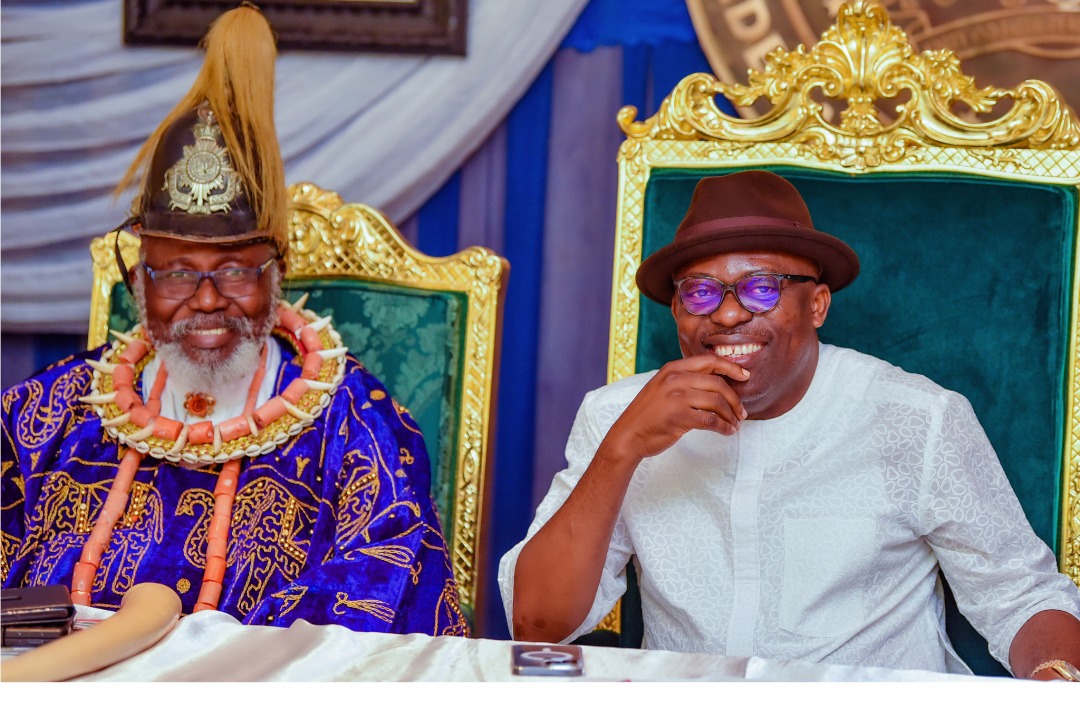
Rivers State Governor, Sir Siminalayi Fubara, has explained that his administration is courageously executing strategic projects that are opening up Kalabari land for unprecedented development and economic growth.
Governor Fubara made the explanation when he received on solidarity visit, a delegation of monarchs, political leaders, elders, women and youths of Kalabari Ethnic Nationality, led by the Amanyanabo of Abonnema, King Disreal Gbobo Bobmanuel, at Banquet Hall of Government House in Port Harcourt, last Tuesday.
The Governor stated that while previous administrations avoided executing the original plan for the Trans-Kalabari Road project due to cost implications, he has ventured into it, and driving the process steadily in order to link Kalabari land to the State capital.
Governor said: “Somebody said, if I don’t do it for my people, who will do it for them. We ventured into the Trans-Kalabari Road, we didn’t close our eyes. Our eyes were open because we knew what we were entering into.
“It is not a joke; it is a big project. We believe that at the end of that project, the level of development that it will attract to that line of entry into Kalabari will be very unprecedented.
“Issues of insecurity from our waterways will be reduced because, at that point we are doing road, people won’t be using the river anymore. The cost of living will also be cheaper.”
Governor Fubara further asserted: “So, you understand that your interest, your safety, your development is key to us. It is not about the number of years that we are going to be here; what is important to this government is the impact we make while we are here.”
Responding to their unanimous endorsement to see him run for a second term in office, Governor Fubara said power belongs to God, and He gives it to whoever finds favour in His sight.
Governor Fubara, however, stated that if God so approved of it, even those who are regrouping against him will not see the path God will lead him because they cannot scuttle such plan.
He added, “Power belongs to God. So, you see, I like believing that we don’t have any problem. When we get to the bridge, we will cross it. If we can break the bridge, Moses will come and create a road for us. So, you don’t need to worry.
“We will cross the bridge. We will cross it in a way that our enemies will be struggling; they won’t see where we are passing. So, don’t worry.”
Governor Fubara acknowledged the immense support to him by Rivers Ijaw, and urged particularly the Kalabari people to stand with honour in their unalloyed support for his administration, which will neither abandon them nor fail to deliver quality projects to the people.
Governor Fubara also responded to their requests and informed them that his administration has completed the Emohua/Tema Junction Road project, and ready to inaugurate the Degema Zonal Hospital in May.
He said the Health Commissioner has been directed to assess the state of the Abonnema General Hospital for immediate rehabilitation, while promising to address the issues of shore protection in the area.
Governor Fubara assured that with the Abonnema sandfilling works completed, the phase two will commence that will include Buguma, explaining that the Commissioner for Works has been tasked to do the assessment immediately.
On the request for the establishment of tertiary institution in the area, Governor Fubara said his administration is already inaudated with memos asking that the off-campus of Rivers State University established previously be revised because it has become difficult to sustain them, but quickly added that the government will consider the establishment of a viable institution that will provide technical and entrepreneurial skills to the people in a sustained manner.
Reading the address of Kalabari Ethnic Nationality, Chief Pawariso Samuel Horsfall, announced that the entire Kalabari people have unanimously endorsed Governor Fubara for a second term, and vowed to mobilise Rivers people to ensure electoral victory for him in the 2027 gubernatorial election.
In his speech, the leader of the delegation and Amanyanabo of Abonnema, King Disreal Gbobo Bobmanuel, expressed the profound thanks of the Kalabari people to Governor Fubara for his genuine love for them, as evidenced in the types and quality of development projects delivered or being executed in the area.
Featured
Senate Passes N54.9trn 2025 Appropriation Bill

The National Assembly, yesterday, passed the N54.9 trillion 2025 Appropriation Bill.
The Tide source reports that this followed the adoption of the report of the Committee on Appropriations on the bill.
The report was presented by Chairman of the Committee, Sen. Solomon Adeola (APC-Ogun).
The Tide source reports that highlights of the passed 2025 appropriation bill indicates an aggregate expenditure of N54.9 trillion, statutory transfers of N3.6 trillion, with recurrent expenditure put at N13.6 trillion.
While the sum of N23.9 trillion was earmarked for capital expenditure, debt servicing was put at N14.3 trillion, fiscal deficit N13.8 trillion, while 1.52 per cent was approved as deficit and GDP.
Olamilekan, while presenting the report, said that the senate debated the general principles of the bill on Dec. 19, 2024.
This, he said, had resulted in the second reading of the bill after which it was referred to his committee for further legislative action.
The senator said that the initial proposal of the executive was N49.7 trillion.
He, however, said while processing the bill, the joint committee on appropriations met the president’s economic team to discuss the revenue projection and expenditure of the appropriation bill.
“After series of meetings, the Committee on Finance, in conjunction with our committee, sourced for additional revenue from some revenue-generating agencies,” he said.
Adeola said that the additional fund was made possible because of the increase in revenue by some of the revenue-generating agencies.
He further stated that some agencies of government provided funds to take care of critical needs.
The lawmaker said that the upward review of the budget from N49.7 trillion to N54.9 trillion was to cater for the difference between the details and the bill, procurement of vaccines and additional funding to some government agencies.
“The joint committee worked harmoniously with the leadership of the National Assembly and the executive arm of government in the processing of the bill.
“This ensured maximum collaboration of the two arms in the utilisation of additional revenue projection.
”This is to improve the funding of some critical projects which could not be adequately funded in the budget proposal earlier submitted by Mr President due to funding constraints,” he said.
Adeola said that the 2025 appropriation bill was presented late as against the 2024 appropriation bill.
He urged the executive to present the budget to national assembly not later than three months before the beginning of the next financial year.
“This will help return the country to the January-December budget circle,” he said.
Featured
CBN Retains N100 ATM Fee For Withdrawal Below N20,000
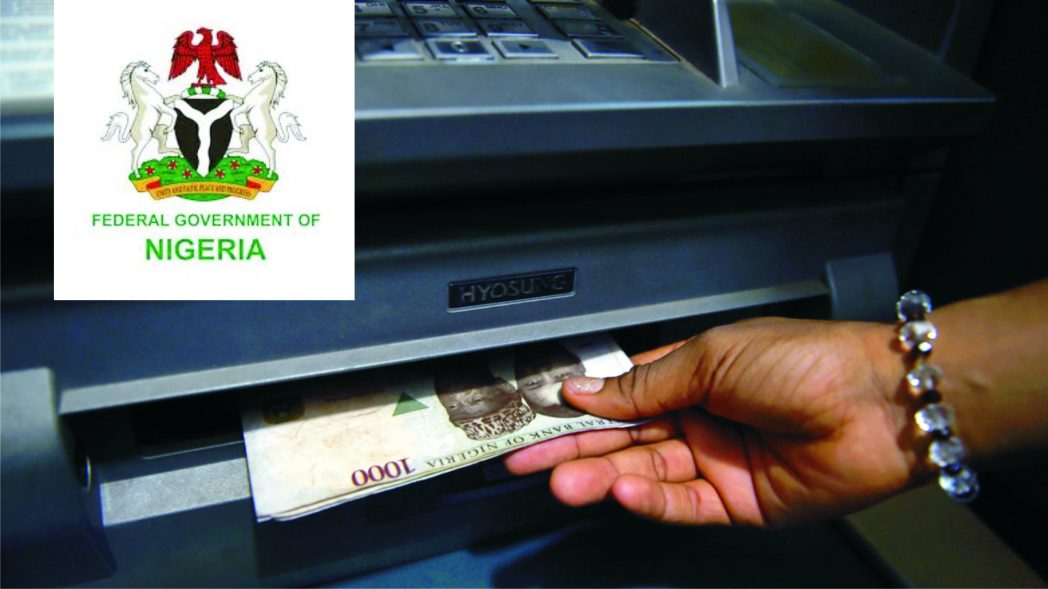
The Central Bank of Nigeria (CBN) has announced that Nigerians withdrawing less than N20,000 from another bank’s Automated Teller Machine will still be charged a fee of N100 per transaction.
This is according to a FAQ document published by the apex bank on its website, yesterday, which provides further information on a new CBN’s directive.
The directive is part of the newly revised ATM transaction fees set to take effect from March 1, 2025, as contained in the CBN circular dated February 10, 2025.
Under the revised fee structure, withdrawals from one’s bank ATMs will remain free of charge.
However, customers using ATMs of other banks will be subjected to a charge of N100 per withdrawal of N20,000 or less at on-site ATMs, which are located within or directly affiliated with a bank branch.
Off-site ATMs, which are positioned outside bank premises such as shopping malls, fuel stations, and other public spaces, will attract an additional surcharge of up to N500 per transaction.
For international ATM withdrawals, charges will be based on cost recovery, meaning customers will bear the exact fee applied by the international acquirer.
The CBN stated that the charge on withdrawals below N20,000 is intended to prevent customers from splitting withdrawals into smaller amounts to avoid fees.
The FAQ document read, “Yes, the fee of N100 will apply if you withdraw less than N20,000 from another bank (a bank other than the one that issued your payment card).
“The reason for applying the fee for every N20,000 withdrawal is to prevent customers from being compelled to break their withdrawals to less than N20,000 per withdrawal.
“In other words, ATM transactions will incur a base fee of N100 per transaction. It is also important to note that a tiered fee structure will apply for transactions exceeding N20,000, with an additional N100 charged for each subsequent withdrawal of N20,000 or portion thereof.”
Customers withdrawing more than N20,000 from another bank’s ATM will be charged an additional N100 for every subsequent N20,000 or portion thereof.
Another significant change in the revised structure is the removal of the three free monthly withdrawals previously allowed for customers using other banks’ ATMs.
From March 1, 2025, all withdrawals at another bank’s ATM will attract charges, potentially increasing costs for customers who frequently use ATMs outside their primary bank.
The apex bank has clarified that financial institutions are not permitted to charge more than the prescribed fees, although banks may reduce charges depending on their business strategy.
Any bank found in violation of the directive, including compelling customers to withdraw less than N20,000 per transaction despite sufficient funds in their account, will be sanctioned accordingly.
Customers who experience such restrictions are encouraged to report complaints to the CBN Consumer Protection Department via cpd@cbn.gov.ng.
To minimise transaction fees, the CBN has advised customers to prioritise withdrawals from their bank’s own ATMs.
It also encouraged Nigerians to explore alternative payment methods such as mobile banking applications, POS transactions, and electronic transfers to reduce reliance on cash withdrawals.
-
Sports5 days ago
Registration For NDSF State Trials Opens
-
Sports5 days ago
FG Lauds Ogun State’s Commitment To Hosting a World Class NSF
-
Nation5 days ago
Council Boss Impeached 48 Hours To LG Polls In Katsina
-
Niger Delta5 days ago
Coalition Urges Politicians Not To Escalate Tension In A’Ibom
-
Politics5 days ago
Edo Gov’ship: Tribunal Fixes Date For Final Written Addresses As APC Closes Case
-
News5 days ago
NAF Sanctions Personnel Involved In Delta Clash With Policemen
-
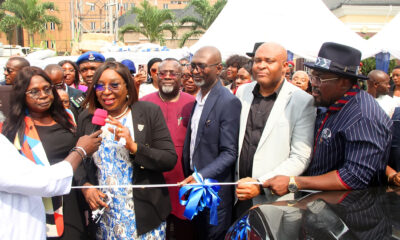
 News5 days ago
News5 days agoRSG Moves To Boost Immunization, Commissions Solarized Cold Room, Vehicles
-
Entertainment5 days ago
Morayo Brown Assures Annie Idibia Amid Divorce Drama


